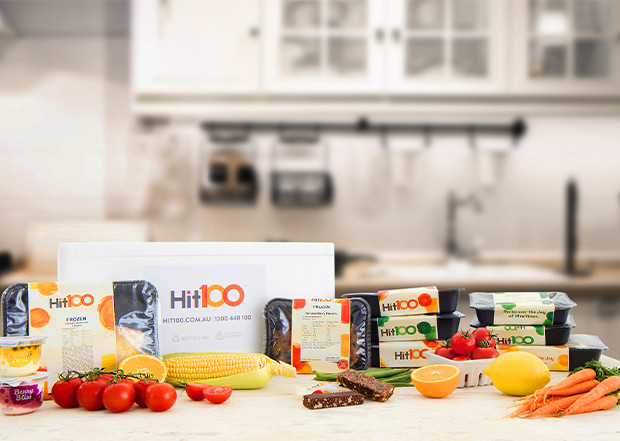
Independent living tips Help and Tips
5 Food Myths... Busted!
Article by Hit100
Eating well when you move out of home or live by yourself is really important for staying healthy, but knowing the difference between fact and fiction when it comes to diet and nutrition can be tricky. Every week there is a new so-called ‘bad' food making the rounds. To understand what's a nutrition myth and what’s not, we asked Hannah Sweetnam, an Accredited Practicing Dietitian at Hit 100, to clear up some confusion on how to maintain a healthy diet.
When it comes to food, everyone seems to have a different opinion and everyone seems to be an expert. Social media, marketing, and even celebrities have come to shape the way we think about nutrition and food. At times, it can be difficult to differentiate between fact and fad. Below are five common food myths that many of us commonly fall for.
MYTH #1: GLUTEN IS BAD FOR YOUR HEALTH
FACT: Gluten is a protein that is found in wheat and, some grains like rye and barley. Even though oats are naturally gluten-free they can often be contaminated with gluten. Gluten becomes a problem only if you are truly intolerant or have coeliac disease. The symptoms can be vague and sometimes mistaken for irritable bowel syndrome. Avoiding gluten when you don’t have a problem may be unnecessary. In fact, some gluten-free products are high in added sugars making them a potentially unhealthy option. If you haven’t been diagnosed with coeliac disease or a gluten intolerance, think twice before reaching for a gluten- free product!

MYTH #2 FROZEN FOODS HAVE LESS NUTRIENTS
FACT: We’ve always been told to opt for fresh foods instead of frozen. However, new research suggests that, in many cases, frozen produce is just as nutritious as fresh produce - and in some cases it can even contain more nutrients! This is because nutrient levels of fruits and vegetables gradually decrease over time (during transit from farm to supermarkets). Frozen fruits and vegetables are picked at their peak, when they have the highest amount of nutrients, and the process of freezing retains these nutrients and prevents them from breaking down. Remember that regardless of whether your food is fresh or frozen, it’s important to consider your method of cooking. This will affect how many nutrients are retained in the food as some vitamins are sensitive to heat or leach out into water.

MYTH #3: LEGUMES ARE A POOR DIETARY CHOICE
FACT: This is one of the most baffling nutritional myths and it is completely incorrect! Legumes are high in dietary fibre, have a low GI and are high in protein (making them a great alternative to meat) and the science tells us that legumes are an excellent dietary choice. Aim to include legumes (e.g. kidney beans, lentils, chickpeas and cannellini beans) in your diet at least 2-3 times a week.

MYTH #4 CARBOHYDRATES ARE BAD FOR YOUR HEALTH
FACT: Carbohydrates have always had a bad reputation when it comes to health and weight loss. This concern stems from the negative effect consuming highly processed foods, refined grains and added sugar can cause. Good, whole sources of carbohydrates offer many health benefits. Carbohydrates are our main source of energy and come packaged up with a range of healthy nutrients such as vitamins, minerals and fibre! Vitamins and minerals are responsible for performing hundreds of roles in the body. Fibre greatly improves our bowel health and keeps us feeling fuller for longer - helping greatly with weight management. Whole sources of carbohydrates also assist with maintaining stable blood sugar levels.
If you are a person living with diabetes, avoiding carbohydrates altogether may increase the risk of experiencing low blood sugar levels, which can have serious consequences.
It’s important to choose good sources of carbohydrates. Opt for those that are high in nutrients and in their most natural form such as fruits, vegetables, whole grains and legumes.

MYTH #5 SUGAR IS POISON AND PEOPLE WITH DIABETES SHOULD AVOID SUGAR
FACT: Everyone, including people with diabetes, can consume sugar within the realms of a healthy balanced diet. The key is to look at where your sugar is coming from and be mindful of how much you are consuming.
Natural sugars, found in fruits, vegetables and dairy products, come with an abundance of beneficial nutrients (like fibre, vitamins and minerals) and hence should form part of a healthy balanced diet.
Added sugars, found in processed foods, confectionery and sugary drinks, are often referred to as ‘empty calories’ – as they provide a whole lot of energy without any nutrients. In addition, foods high in added sugar are not great for teeth health and it is therefore best to only have them sometimes.
This article was written by Hannah Sweetnam (Dietitian at Hit 100).
Need some help with choosing the right food from the supermarket? See our blog post on “Making cooking easier - convenient and healthy supermarket items” - you might be surprised at what you learn!






